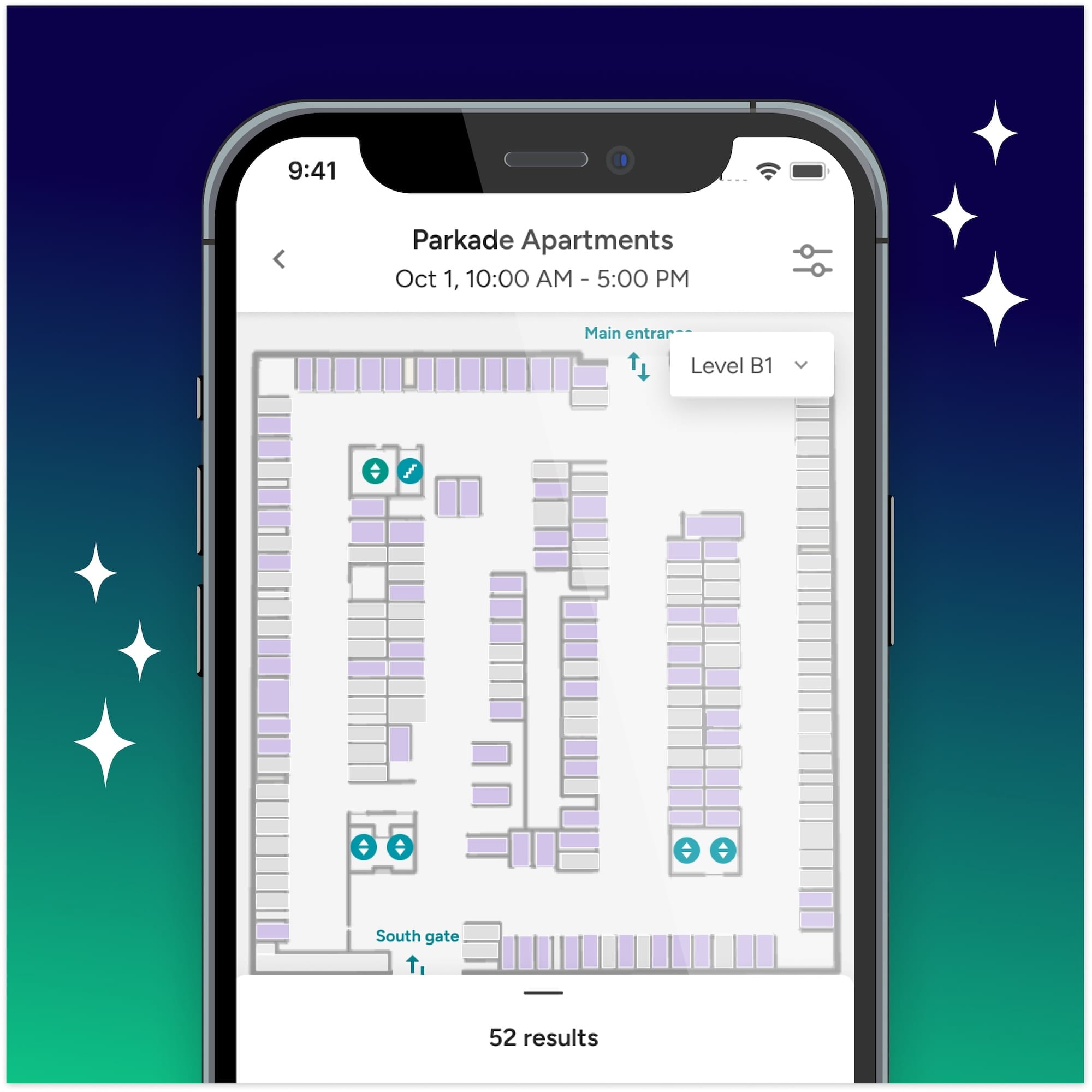

TABLE OF CONTENTS
Parking planning is one of the most important and also one of the trickiest feats that property managers have to take on. And when you’re faced with the issue of being tight on space and not meeting the parking needs of your residents, tandem parking can appear to be a solution.
In many ways, tandem parking seems like a necessary evil. While it comes with its (substantial) downsides, it is quite effective at helping you squeeze a couple extra spots into an otherwise overfilled parking lot or garage.
In this piece, we’re going to zoom in on this issue and help you determine whether tandem parking is the right option for you, and if it’s not, what the alternatives are.
Typically, a tandem parking space is one long space that has enough room to fit two cars right in front of each other. Sometimes, there may be tandem spaces that fit up to four cars, but that’s not the norm.
The average dimensions of a standard 2-car tandem space is 9 feet wide and 36 feet long.

The reason that tandem spots are more space-efficient than a standard spot is because one car blocks another one in. In order for the car on the inside to leave, the outside car will first need to move. Compared with traditional parking where all cars can move independently of one another, tandem parking requires coordination between owners of the two cars who are sharing the spot.
This can be useful for very small lots where you don’t have the room for an adequate number of standard spots. It’s also popular for properties that have very narrow spaces available for parking, like townhouses, for example.

As you can imagine, the required coordination between owners can cause more than a few headaches.
Especially for those who commute to work every day, having easy access to their vehicles is important. Having to coordinate with a spot neighbor any time they need to leave, whether it’s to move their own car or ask someone to move theirs, can quickly become cumbersome.
This is especially inconvenient during busy hours or if residents are running late. Having to take that extra couple of minutes (or perhaps longer, if they can’t get a hold of their spot neighbor) can throw a major wrench in their day.
We’ll just let this user from reddit explain how they feel about the inconvenience caused by a tandem spot.

Because of the required coordination when sharing spots, residents are likely to experience dissatisfaction when they can’t get a hold of – or get along with – their spot neighbor. If residents are continuously dealing with communication problems, hostility can grow. And there are few worse things for community morale than disputes between residents.
You can be assured that your staff won’t be shielded from the disputes and the inconveniences of tandem parking. Often, staff will be brought in after the dispute has already escalated, making for more fraught communication from residents.
On top of the emotional toll that this can take, the time needed to mediate disputes and identify solutions can eat into their day and overtake more important property management tasks.
Because cars are stacked one behind the other in tandem parking spots, the potential of damage to vehicles is much higher. If someone is in a pinch to leave and can’t get a hold of the person that they share their spot with, they may be more likely to try to squeeze out anyway and risk scraping against the other car.
Despite the downsides of tandem parking, there are select instances where it may make sense to use it as a strategy to make the most of your parking lot.
Some residents prefer to be budget-conscious and would love the opportunity to trade a little convenience in order to save some money each month. Some may even be excited to get a cheaper double spot if they have two cars and they rarely use one of them. Or if they often have guests over who they want to reliably reserve spots for.

Of course, pricing preferences can go the other way, too, as demonstrated by this user:

The key is to give your residents the choice, not to stick residents with a spot they don’t want, especially if they’re paying the same price as everyone else.
Some communities have a tight-knit, collaborative culture that would welcome cooperative parking solutions as a way to handle a parking shortage. In these instances, you may be less likely to experience the hassle and disputes as residents are more likely to work together to proactively plan out their driving schedules.
Great communication is the only way to make tandem parking sustainable at a multifamily property. If you set up, maintain, and continuously monitor reliable communication channels, especially those that leverage easy-to-use technology that can help to automate a lot of the most tedious logistics of tandem parking. An app like Parkade, for example, can make it easier to report problems with a tandem spot and to get redirected to a temporary spot if you’re blocked out of your spot, for example.
On the flip side, there are many instances where tandem parking is going to do more harm than good. In the following scenarios, you may want to look into alternative solutions to manage your space more strategically.
This is the other side of the coin of our point about the value of a budget alternative above. If your residents have no say in whether they receive a tandem spot or not, and worse, if they don’t receive a discounted rate for that spot, it’s likely to sour their experience.
It can be difficult enough to coordinate shifting cars around with people that you live with, but it’s made much more inconvenient when coordinating with non-roommates. Often, if people live together, they will give their roommates a copy of their key so that a car can be moved in a pinch. This takes a level of trust that many people may not have with someone they don’t know well.
Disputes are also more likely to happen between people who primarily communicate about parking and parking only.

Zoning laws and regulations regarding tandem parking vary by location. For example, in Burbank, CA, tandem parking is permitted for Accessory Dwelling Units (ADUs) with specific setback and placement rules. In New York City, tandem parking is allowed under certain conditions, such as on lots at least 33 feet wide.
Property managers should consult local zoning codes to ensure compliance with all applicable regulations before implementing tandem parking.
While it can be tempting to see tandem parking as a quick fix to a parking shortage, it may backfire if you already are experiencing other issues with parking management, like enforcement, for example.
Parking is one of the most important considerations for residents when it comes to deciding where to live (or where to keep living), so any additional problems may be the final straw for residents who are already having a frustrating parking experience.
Luckily, there are several other strategies that can help you more effectively tackle parking shortages, with fewer side effects.
The root of your problem may be that you’re not putting enough limits on who’s using your parking. Whether you’re offering up paid or free parking, technology can help you put guardrails in place to make sure that all your residents are getting their needs met.


For example, you may have someone who lives in a studio but has two cars taking up a spot in your lot, while 3 people living in a 3-bedroom apartment don’t each have a spot to themselves.
Putting a limit on who is able to get a spot and how many spots can go a long way to easing a parking shortage.
We always recommend putting a fee, even if it’s nominal, on parking to help ensure that only those who truly need parking are using it. Free parking, in most cases, does more harm than good.
But even if you are charging for parking and still experiencing shortages, you may need to revisit your pricing strategy. Pricing that is set too low is likely to lead to overutilization, which causes shortages. Raising prices even a small amount can help to offset some of the demand.
We’d always recommend a more dynamic pricing strategy as well, which technology like Parkade makes breeze. For example, if some spots sit empty, whether it’s due to distance from the building, compact size, or something else like proximity to trash cans, you likely want to price these spots lower than others to incentivize residents to use them. Whereas for spots in a prime location or with no neighboring spots, or EV charger access, should have a higher price tag. This dynamic pricing strategy is especially helpful if you are experiencing long wait lists for some spots while others go unclaimed.
The best solution to a parking shortage, or any other parking management issue, is to overhaul your current parking management system. We’ve seen countless issues, from enforcement to shortages to overwhelming staff burden, be completely eliminated by leveraging a better system.
We strongly believe that a spreadsheet or, worse, pen and paper system is where good parking management goes to die.
When you implement a parking solution like Parkade, you’re able to dynamically respond to demand, leverage empty spots between leases for short-term parking, automate your enforcement processes, and give your residents self-serve capabilities to reserve parking (while still taking into account the rules we mentioned earlier).
In short, better parking management, in most cases, makes tandem parking go from a necessary evil to an unnecessary evil.
.jpg)
As parking management becomes increasingly digital, security becomes critical — and we’re excited to share that we've achieved a major security milestone.
Read Story
We’re thrilled to announce one of our most significant leaps forward this year: the launch of dynamic maps across our mobile and web applications.
Read Story
Now that AB 1317 is official, it’s time to brush up on the requirements and see how your properties stand to benefit.
Read Story